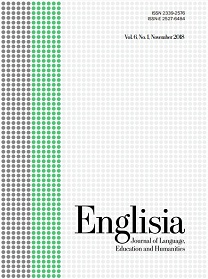Subtle racism in English language: A socio-semiotic analysis of black-prefixed English lexicons
DOI:
https://doi.org/10.22373/ej.v8i2.8132Keywords:
Racism, English Language, Semiotics, Black-Prefixed Words, MeaningsAbstract
The English language has become a global language and as such, it is expected to be devoid of racial discrimination and prejudice. The English language has both verbal and non-verbal systems of communication which often requires semantic and semiotic analyses for the purpose of generating meaning. Most English words with the prefix 'black' have meanings that are either connotative or derogative. Using Jakobson’s transmutation theory, the study establishes the relationship between colour, culture, and racial prejudice in English language black-prefixed lexicons. This is a subtle form of racism when such words are taught in schools. The design adopted for this research was a qualitative, and no variables were manipulated because it was a library research. The study examined the socio-semiotic elements of black-prefixed words in the English language to establish that there is subtle racism in English expressions used and taught in schools. It was concluded that instruction in the language should be revitalized to eradicate racism of any form, especially in the second language classroom.
References
Almalech, M. and Habil, N. (2014). Semiotics of Colour. Retrieved online 19th June, 2020 from http://semio2014.org/en/semiotics-of-color
Al-Shraideh, M and El-Sharif, A. (2019). A semiotic perspective on the denotation and connotation of colours in the Quoran. International Journal of Applied Linguistics & English Literature, 8(1): 18-33.
Austin, G. (2004). The burden of being Black. Delta Winds: A Magazine of Student Essays, 17, 10-13.
Caivano, J. L. and López, M.A. (2006). Can colour be an anti-globalization factor? Analysis of colours in branding. In proceedings of the Interim Meeting of the International Colour Association ‘Colour in Fashion and Colour in Culture’, 24–27 October 2006, 13–18. Johannesburg: McGraw-Hill Books.
Darrodi, M. M. (2012). Models of colour semiotics. An unpublished Ph.D. Dissertation. University of Leeds
Groupe μ. (1995). A rhetoric of visual statements. In Thomas-Albert Sebeok and Donna Jean Umiker-Sebeok, Advances in visual semiotics: the semiotic web 1992–93, 581–599. Berlin/New York: Mouton de Gruyter.
Jakobson, R. (2004 [1959]). On linguistic aspects of translation. In Lawrence Venuti (ed.), The Translation Studies Reader. New York and London: Routledge. 138–143
Kenney, K. (2005). Representation theory. In Smith, K. Handbook of Visual Communications: Theory, Methods and Media, ed. L.E. Associates New Jersey: London.
Kourdis, E. (2014). Colour as inter-semiotic translation in everyday communication: A socio-semiotic approach. A paper presented at the Proceedings of the world congress of the IASS/AIS. International Association of Semiotic Studies Bulgaria: NBU Publishing House. Retrieved online 22nd June, 2020 from www.Iass-Ais.Org/Proceedings2014/View_Lesson.Php?Id=45
Lyons, D. (2017). How many people speak English, and where is it spoken? Retrieved online 11th June, 2020 from https://www.babbel.com/en/magazine/how-many-people-speak-english-and-where-is-it-spoken
Lyons, D. (2020).11 Common English Words And Phrases With Racist Origins. Retrieved online 26th June, 2020 from https://www.babbel.com/en/magazine/common-racist-words-phrases
Mapedzahama, V. and Kwansah-Aidoo, K. (2017). Blackness as Burden? The lived experience of black Africans in Australia. SAGE Open, July-September, 2017: 1 - 13
McClean, V. (The New York Times Feb. 7th, 1988).Connotations of 'Black' held to be Nonracial. Retrieved online 22nd June, 2020 from https://www.nytimes.com/1988/02/07/nyregion/l-connotations-of-black-held-to-be-nonracial-669388.html
Oshodi, J.E. (2006). Why is ‘black’ always a bad word? Retrieved online 26th June, 2020 from http://www.stlamerican.com/news/editorials/why-is-black-always-a-bad-word/article_9fdf3fd1-a263-536a-8b11-a80d4dcfe0b1.htm
Oxford Living Dictionaries: https://en.oxforddictionaries.com/definition/colour
Pastoureau, M. (2009). Black: the history of a color. Princeton: Princeton University Press.
Torop, P. (2002). Translation as translating as culture. Sign System Studies 30(2):593–605.
Torop, P. (2008). Translation and Semiotics. Sign Systems Studies 36(2):253-257.
Watts-Jones, D. (2004). Confronting the language of subtle racism. Excerpts from social justice or political correctness? In The secret lives of clients: The inside story of what really happens in therapy, March/April 2004 issue. Retrieved online June 17th 2020 from https://www.psychotherapynetworker.org/blog/details/1318/confronting-the-language-of-subtle-racism
Downloads
Published
Issue
Section
License
Proposed Policy for Journals That Offer Open Access
Authors who publish with Englisia journal agree to the following terms:
- Authors retain copyright and grant the journal right of first publication with the work simultaneously licensed under a Creative Commons Attribution License that allows others to share the work with an acknowledgement of the work's authorship and initial publication in this journal.
- Authors are able to enter into separate, additional contractual arrangements for the non-exclusive distribution of the journal's published version of the work (e.g., post it to an institutional repository or publish it in a book), with an acknowledgement of its initial publication in this journal.
- Authors are permitted and encouraged to post their work online (e.g., in institutional repositories or on their website) prior to and during the submission process, as it can lead to productive exchanges, as well as earlier and greater citation of published work (See The Effect of Open Access).









